#Taoist
Text
Knowing others is intelligence; knowing yourself is true wisdom.
Mastering others is strength; mastering yourself is true power.
If you realize that you have enough, you are truly rich.
If you stay in the center and embrace death with your whole heart, you will endure forever.
-Lao Tzu
#lao tzu#stephen mitchell#quote#peace#calm#stillness#life#wisdom#inner peace#love#happiness#spiritual#tao#taoism#taoist
322 notes
·
View notes
Text
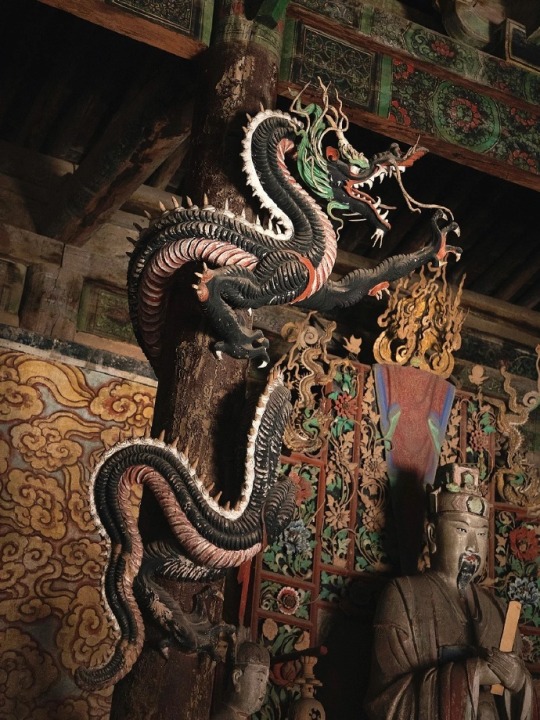
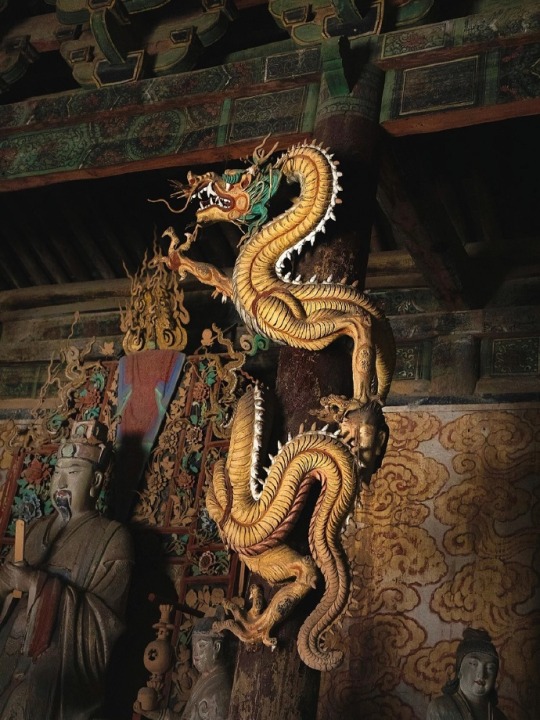
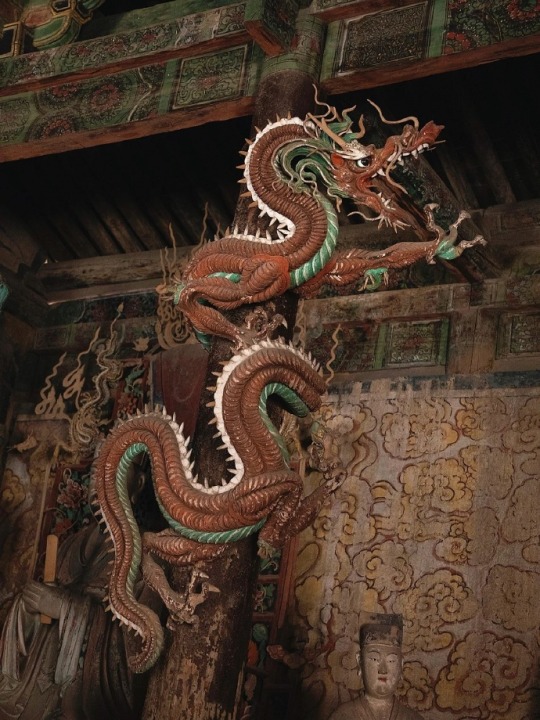
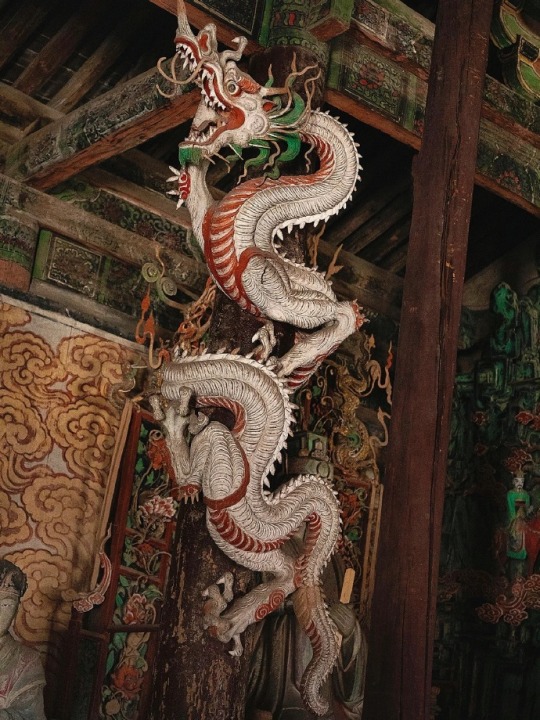

Mythological Realism: Elemental Dragons
Four-color coiled dragons on the pillars of the Supreme Talisman (Taifu) Temple (太符觀).
The dragons are painted in the colors of the primary elements, embodying the archetypal creative forces. In Chinese religious art, almost any concept can be expressed in the language of dragons.) Their children, descendants and relatives frolic on the temple walls among curly clouds.
In view of the striking liveliness, I would classify these images as mythological realism.)
Since its construction in the fifth year of the Jin dynasty (1200), the temple has been repeatedly expanded and supplemented with new buildings over the centuries. Most of the surviving statues are from the Ming dynasty.
The Supreme Talisman Temple is located in Fenyang (汾陽), Shanxi.
Photo: ©故尔耳
#ancient china#chinese culture#chinese art#chinese mythology#ming dynasty#taoist practices#religious art#chinese temple#Taoist temple#taoism#taoist#statue#sculptures#statues#daoism#jin dynasty#dragon#dragons#dragon art#creatures#wood carving#woodworking#temple architecture#wooden architecture#wooden buildings#chinese architecture
364 notes
·
View notes
Text
DARK TAOIST POPE
by Kevin Glint

#tentacles#fhtagn#kevin glint#concept art#chara design#dark fantasy#pope#taoist#sorcerer#warlock#creature#monster#horror#swarm#fhtagnnn
107 notes
·
View notes
Text

Doma challenge100
No.014 " Taoist"
74 notes
·
View notes
Photo
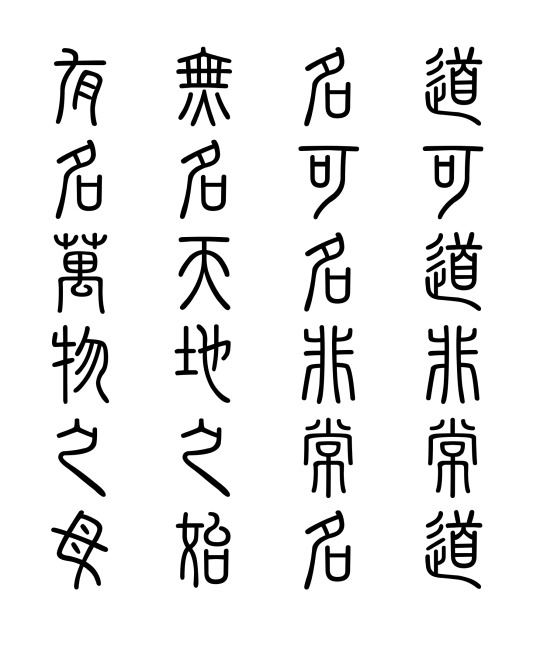
First lines of the Dao De Jing in the ancient Chinese Seal Script:
The Dao that can be trodden is not the enduring and unchanging Dao.
The name that can be named is not the enduring and unchanging name.
Having no name, it is the Originator of heaven and earth;
having a name, it is the Mother of all things.
#daoism#daoist#dao de jing#taoism#taoist#tao te ching#chinese#seal script#calligraphy#classical chinese#philosophy
128 notes
·
View notes
Photo

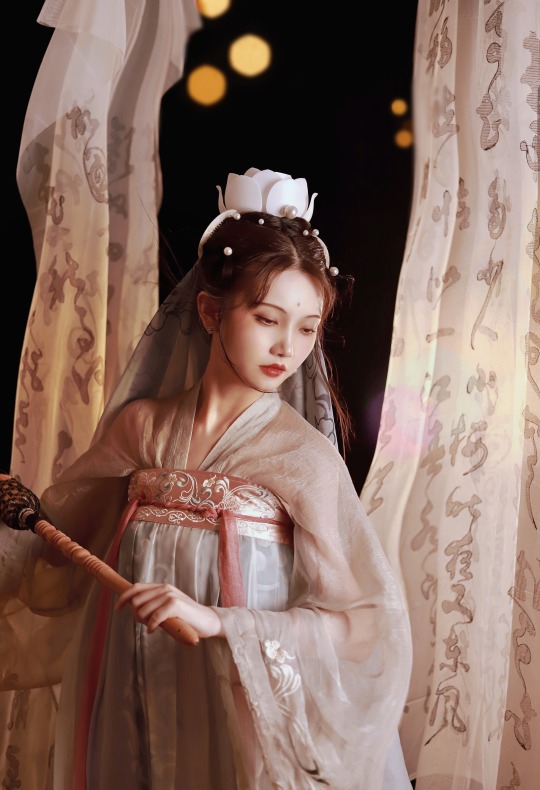
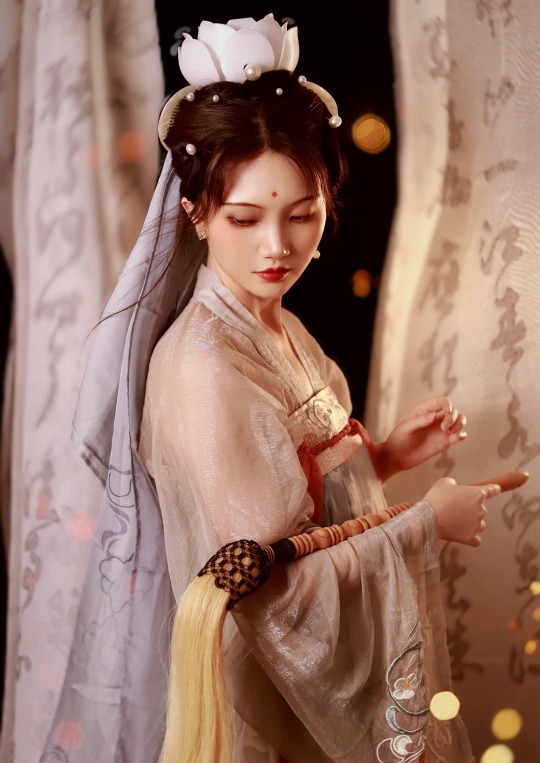

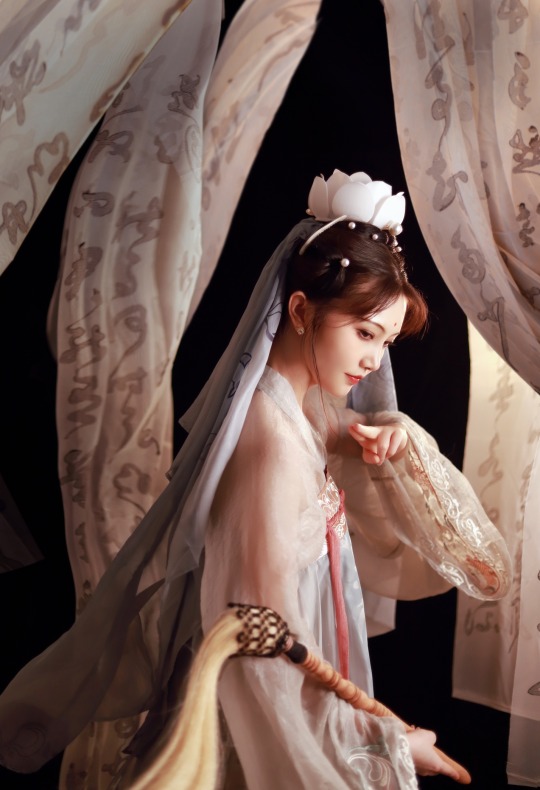
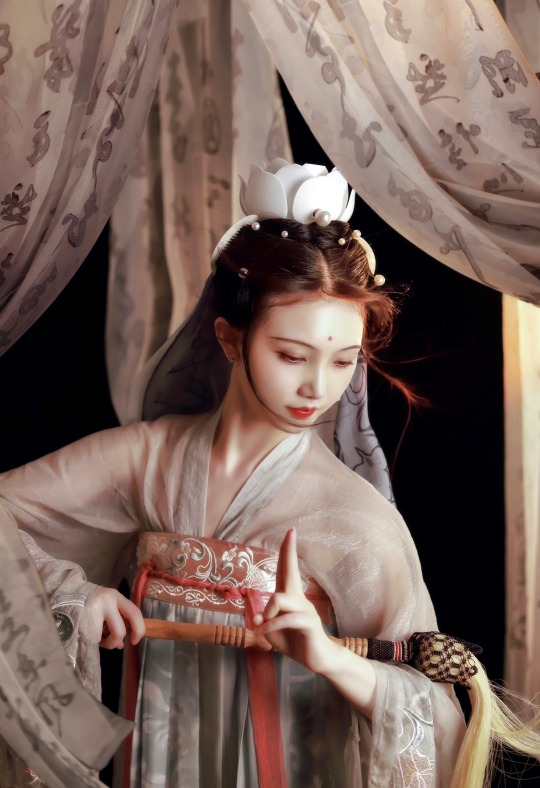
𝒯𝒶𝑜𝒾𝓈𝓉 𝐼𝓃𝓈𝓅𝒾𝓇𝑒𝒹 𝓂𝒶𝓀𝑒𝓊𝓅 𝓈𝑒𝓇𝒾𝑒𝓈 𝒷𝓎 晓十_玄影任雲蹤
230 notes
·
View notes
Photo
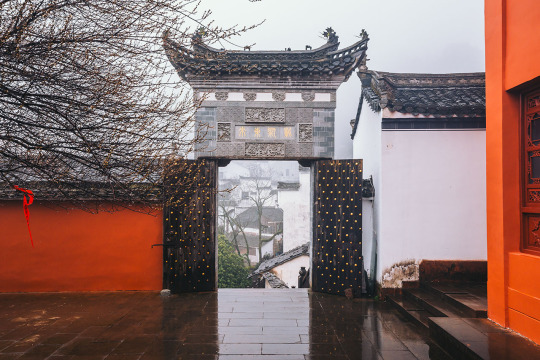
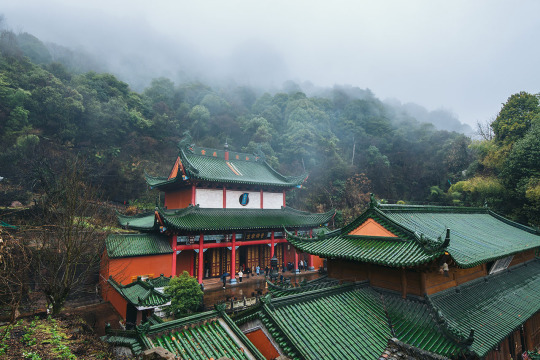
Taoist temple
128 notes
·
View notes
Text
i love you chi ling dai cheng i love you cats i love you mobility aids i love you music i love you bass i love you reptiles i love you poetry i love you buddhism i love you zombie apocalypses i love you punks i love you paranormal activity i love you psychology i love you taxidermy i love you cds i love you late night car drives i love you saturn i love you therianthropy i love you hugs i love you moths i love you literature i love you fairy lights i love you urban exploring i love you concerts i love you accessibility i love you headphones i love you ear defenders i love you rain i love you white witchcraft i love you photography
#cpunk#cripple punk#disabled#spoonie#disability#bass#cats#therianthropy#mobility aids#metal#reptiles#poetry#literature#buddhist#taoist#buddhism#religion#tlou#zombie apocalypse#punk#urbex#urban exploration#ear defenders#autistic#psychology#taxidermy#cds#concerts#white witch#photography
9 notes
·
View notes
Text
What is Taoism?
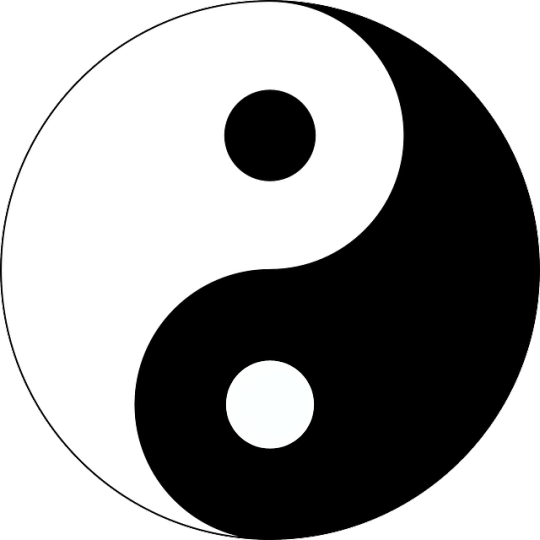
Taoism originated in China between 600 and 500 BC, but the roots of Taoism can be traced back to shamanic practices from the earliest tribal communities. The Chinese word for shaman (wu) was first recorded during the Shang Dynasty (1600-1046 BC), but it is believed that these traditions date back to the very origins of Chinese culture. In fact, many of the stories surrounding Fu Hsi (or Fu Xi), the mythological founder of Chinese civilization are very shamanic. For example, Fu Hsi is considered the originator of the I Ching, an ancient Chinese divination text and the basis of Chinese thought. According to legend, he discovered the symbols of the I Ching in the pattern of markings on the back of a turtle that emerged from a river. This is a classic shamanic tale that combines nature and divination, resulting in the attainment of profound knowledge.
Philosophical Taoism, often represented by the yin-yang symbol, emphasizes living in harmony with the Tao (the Way), or Ultimate Reality, a presence that existed before the universe was formed and which continues to guide the natural world and everything in it. Tao is the ultimate source and way (or process) of nature and the universe. To live in harmony with the Tao is to go with the flow of life rather than against it. It is a way to conserve life's vitality by not expending it in the useless ways of friction and conflict. Early Taoists perceived that the ultimate nature of this mysterious force was beyond intellectual comprehension but could be discerned by the intuitive mind. The sages observed that through meditation, one could attain Tao or communion with the way of the universe itself.
Through meditation and other devotional activities, Taoists seek to bring their lives into accord with the Tao. They believe that by abiding in the Tao, or in harmony with the Cosmos, one may attain a state of such inner clarity and insight that all actions become synchronous and spontaneously correct. They refer to this state of harmony with nature and the universe as wu wei, or "non-doing." Non-doing is not a withdrawal from action, but rather the achievement of a higher kind of action: action in accord with the natural order. The concept of wu wei more closely suggests a way of existing without conscious effort, as nature does. Such a person knows what to do by abiding in a state of quietism, by letting go of all worldly thought so that the creative force of the Tao may enter their minds and bodies. Such accord with the Tao allows one to accomplish things without effort in a way that benefits everyone.
Taoism is an inner way as well as an outward path. One should outwardly "go with the flow" while inwardly adhering to one's true nature. Taoists seek to integrate inner and outer experiences while uniting body, mind and spirit into a harmonious whole. Taoism views humanity as a microcosm of the macrocosm we call the universe. Each human being is a hologram of the Cosmos, a weaving together of universal information from a particular point of view. Essentially, we are the universe experiencing itself in human form.
Taoists equate the body with the earthly realm, the mind with the human realm, and the spirit with the heavenly realm. By bringing the body, mind and spirit into accord, one transforms personal experience and influences the interactions of the three cosmic realms. Following the Tao is a journey requiring simplicity, balance and introspection. The lifelong quest of the Taoist is to identify their innermost purpose in life, and then use every means at their disposal to achieve it.
86 notes
·
View notes
Text
Oh my this scene! don't know how many times i might have replayed ಥ⌣ಥ
#silent confession#taoist#neo hou#hou minghao#julio wan yan#zhu ge qing#wang ye#my gay heart#i am nobody#chinese drama#cdrama#this will live rent free in my mind#ill ship if i can
12 notes
·
View notes
Text
Close your mouth,
block off your senses,
blunt your sharpness,
untie your knots,
soften your glare,
settle your dust.
-Lao Tzu
#lao tzu#stephen mitchell#quote#peace#calm#stillness#life#wisdom#inner peace#love#happiness#spiritual#tao#taoism#taoist#tao te ching#nondualism#nonduality
166 notes
·
View notes
Text
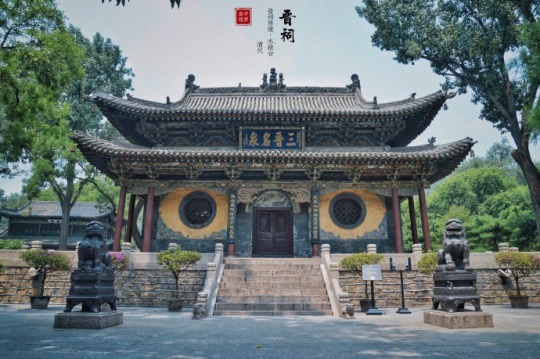
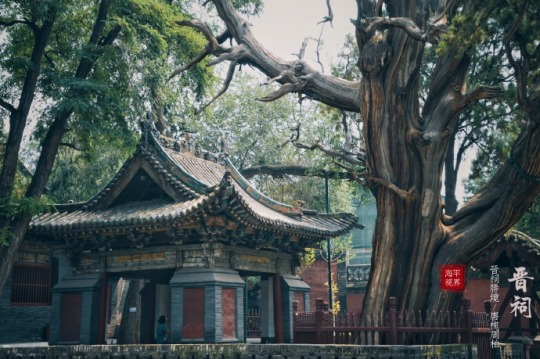
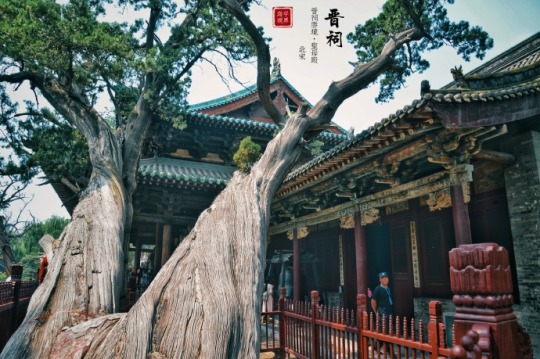
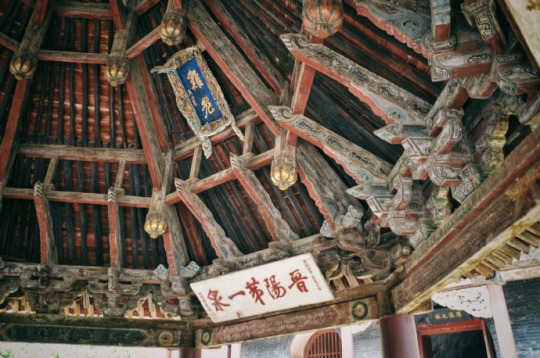
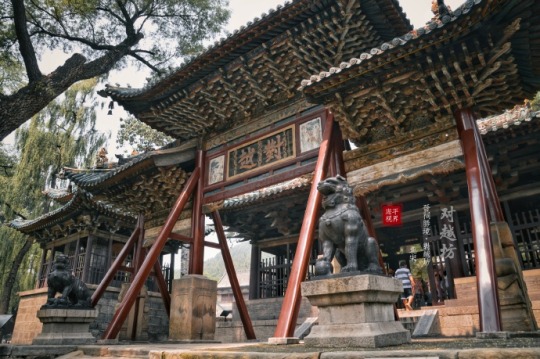
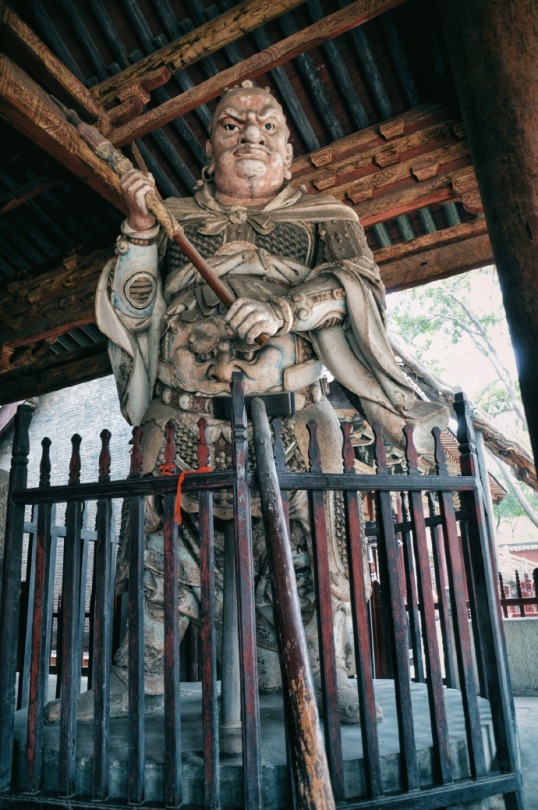
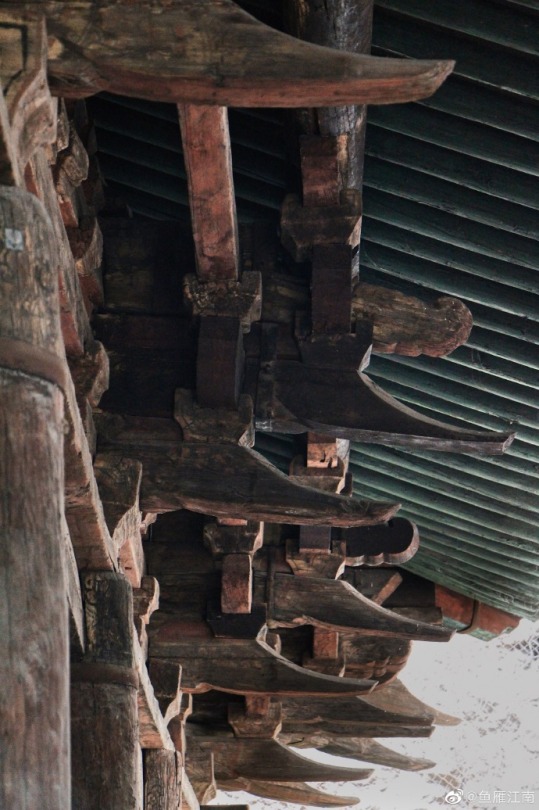

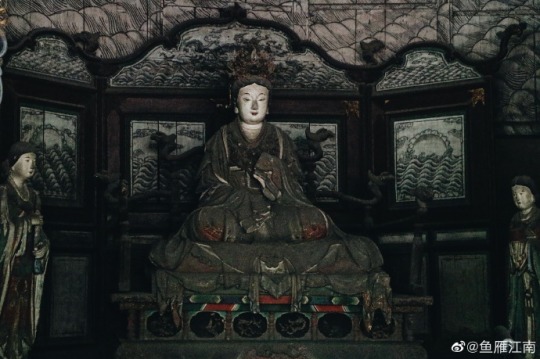
The Hall of the Holy Mother: One of the Oldest Places of Worship
The Hall of the Holy Mother (聖母殿) in Jinci Temple (晉祠), Shanxi. Built during the reign of Emperor Renzong (仁宗) of the Northern Song dynasty (1023-1032).
The hall is part of the ever evolving temple complex founded about one and a half thousand years ago. Over the centuries of countless transformations, it has accumulated buildings of various periods and styles.
The temple is dedicated to Shuimu (水母), The Old Mother of Waters, witch-goddess of Chinese lore, appearing in the form of a dragon, a snake or a charming lady with a sword and a yoke.
Photo: ©鱼雁江南, 雪夜魚舟
#ancient china#chinese culture#chinese mythology#taoism#chinese architecture#song dynasty#wooden architecture#wooden buildings#chinese customs#taoist#chinese folk religion#chinese temple#religious art#temple architecture#taoist deities#goddess#goddess worship#mother goddess#great mother#chinese folklore#dragon art#dragon
246 notes
·
View notes
Quote
Water is yielding but all-conquering. Water extinguishes Fire or, finding itself likely to be defeated, escapes as steam and re-forms. Water washes away soft Earth or, when confronted by rocks, seeks a way round. Water corrodes Iron till it crumbles to dust; it saturates the atmosphere so that Wind dies. Water gives way to obstacles with deceptive humility, for no power can prevent it following its destined course to the sea. Water conquers by yielding; it never attacks but always wins the last battle.
Tao Chênh of Nan Yeo, an 11th-century Taoist scholar
#water#way of water#the way of water#be like water#act like water#flow like water#tao#taoist#taoism#dao#daoism#daoist#tao chênh#tao chenh#nan yeo#zen#zazen#buddhist#buddhism#zen buddhist#zen buddhism#clouds#clouds and water#unsui#the wheel of life#wheel of life#virtue#virtue of water#the virtue of water#virtuous
80 notes
·
View notes
Text
“When I let go of what I am, I become what I might be.” —Lao Tzu
daily positivity and love from your gay aunties 🥰
#lesbian positivity#positive vibes#good vibes#quotes#lao tzu#laozi#taoist#happy#gay aunties#mindset#growth#personal development#everything will be okay#everything will be fine#self improvement#self empowerment#you got this#keep going#don't give up#lgbt positivity#hope#hopecore#wlw#lesbian
13 notes
·
View notes
Text
The first bowl moistens my lips and throat;
The second bowl banishes all loneliness;
The third expelled the dullness from my mind,
Inducing inspirations born from all the books I’ve read;
At the fourth cup, I begin to perspire –
life's troubles evaporate through my pores.
The fifth cup cleanses my entire being.
Six cups and I am in the realm of the Divine.
Seven cups - ah, but I can drink no more:
I can only feel the gentle breeze blowing through my sleeves,
wafting me away to the Isle of Immortality!
Lu Tung, 8th century Taoist poet
20 notes
·
View notes
Text

Moon Io from Spacecraft Juno: There goes another one! Volcanoes on Jupiter's moon Io keep erupting. To investigate, NASA's robotic Juno spacecraft has begun a series of visits to this very strange moon. Io is about the size of Earth's moon, but because of gravitational flexing by Jupiter and other moons, Io's interior gets heated and its surface has become covered with volcanoes. The featured image is from last week's flyby, passing within 12,000 kilometers above the dangerously active world. The surface of Io is covered with sulfur and frozen sulfur dioxide, making it appear yellow, orange and brown. As hoped, Juno flew by just as a volcano was erupting -- with its faint plume visible near the top of the featured image. Studying Io's volcanoes and plumes helps humanity better understand how Jupiter's complex system of moons, rings, and auroras interact. Juno is scheduled to make two flybys of Io during the coming months that are almost 10 times closer: one in December and another in February 2024.
Image Credit: NASA, JPL-Caltech, SwRI, MSSS; Processing & Copyright: Ted Stryk & Fernando García Navarro :: [Robert Scott Horton]
* * * * *
73
The Tao is always at ease.
It overcomes without competing,
answers without speaking a word,
arrives without being summoned,
accomplishes without a plan.
Its net covers the whole universe.
And though its meshes are wide,
it doesn’t let a thing slip through.
-Stephen MitchellTao te Ching
#Jupiter#Io#Moon#NASA#Robert Scott Horton#space#Stephen Mitchell#Tao te Ching#words and writing#Tao#Taoist#poem
8 notes
·
View notes